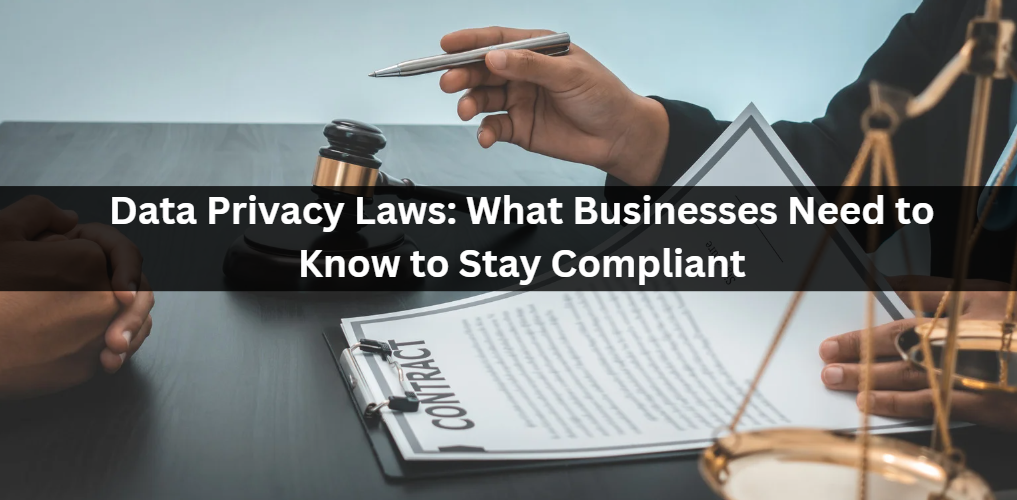In an era where data is one of the most valuable assets for businesses, understanding and adhering to data privacy laws is critical. These regulations are designed to protect personal information and ensure that businesses handle data responsibly. This guide provides an overview of key data privacy laws, explores compliance requirements, and offers practical advice for businesses to stay on the right side of the law.
Contents
- 1 1. Understanding Key Data Privacy Laws
- 2 2. Compliance Strategies for Businesses
- 3 Conclusion
1. Understanding Key Data Privacy Laws
1.1. General Data Protection Regulation (GDPR)
Overview
- Jurisdiction: The GDPR applies to businesses operating in the European Union (EU) and those outside the EU that process the personal data of EU residents.
- Scope: It covers a broad range of personal data, including names, contact details, and IP addresses.
Key Requirements
- Data Protection Principles: Businesses must adhere to principles such as data minimization, purpose limitation, and accuracy.
- Consent: Explicit consent is required for collecting and processing personal data, and individuals have the right to withdraw consent at any time.
- Data Subject Rights: The GDPR grants rights to individuals, including the right to access, rectify, erase, and restrict processing of their data.
- Data Protection Officer (DPO): Certain businesses must appoint a DPO to oversee data protection activities.
- Data Breach Notification: Businesses must report data breaches to authorities within 72 hours and notify affected individuals if the breach poses a high risk.
1.2. California Consumer Privacy Act (CCPA)
Overview
- Jurisdiction: The CCPA applies to businesses operating in California or those that collect personal data from California residents.
- Scope: It covers personal information such as names, addresses, social security numbers, and more.
Key Requirements
- Consumer Rights: California residents have the right to know what personal information is being collected, to access and delete their data, and to opt out of the sale of their data.
- Privacy Notices: Businesses must provide clear privacy notices informing consumers about data collection practices and their rights.
- Data Sales: Consumers have the right to opt out of the sale of their personal data, and businesses must provide a “Do Not Sell My Personal Information” link on their websites.
1.3. Health Insurance Portability and Accountability Act (HIPAA)
Overview
- Jurisdiction: HIPAA applies to covered entities and business associates in the United States that handle protected health information (PHI).
- Scope: It covers health-related data, including medical records and billing information.
Key Requirements
- Privacy Rule: Ensures that PHI is protected and only disclosed with patient consent or as required by law.
- Security Rule: Mandates safeguards to protect PHI from unauthorized access and breaches.
- Breach Notification Rule: Requires notification of breaches involving unsecured PHI to affected individuals and the Department of Health and Human Services (HHS).
1.4. Personal Information Protection and Electronic Documents Act (PIPEDA)
Overview
- Jurisdiction: PIPEDA applies to businesses operating in Canada that handle personal data.
- Scope: It covers personal information collected, used, or disclosed in the course of commercial activities.
Key Requirements
- Consent: Businesses must obtain consent for the collection, use, and disclosure of personal information.
- Access and Correction: Individuals have the right to access and request corrections to their personal information.
- Data Protection: Businesses must implement measures to protect personal information from loss or theft.
1.5. Brazilian General Data Protection Law (LGPD)
Overview
- Jurisdiction: The LGPD applies to businesses processing personal data in Brazil or from Brazilian residents.
- Scope: It covers personal data similar to the GDPR, including identifiers and sensitive information.
Key Requirements
- Legal Basis for Processing: Businesses must have a legal basis for processing personal data, such as consent or legitimate interests.
- Data Subject Rights: Individuals have rights including access, correction, deletion, and data portability.
- Data Protection Officer: Appointing a DPO is mandatory for certain businesses.
2. Compliance Strategies for Businesses
2.1. Conduct a Data Audit
Inventory of Data
- Data Mapping: Identify and document the types of personal data collected, processed, stored, and shared by your business.
- Data Flow Analysis: Map out how data flows within your organization and with third parties.
Assessment
- Risk Assessment: Evaluate the risks associated with data processing activities and identify potential areas of non-compliance.
- Gap Analysis: Compare current practices with legal requirements to identify gaps that need to be addressed.
2.2. Develop and Implement Privacy Policies
Privacy Notices
- Transparency: Create clear and comprehensive privacy notices that inform individuals about data collection practices, purposes, and their rights.
- Updates: Regularly review and update privacy notices to reflect changes in data processing activities and legal requirements.
Data Protection Policies
- Data Handling: Develop policies for collecting, storing, and processing personal data, including procedures for handling data breaches.
- Training: Provide training to employees on data protection policies, privacy practices, and legal obligations.
2.3. Ensure Data Security
Technical Measures
- Encryption: Use encryption to protect personal data both in transit and at rest.
- Access Controls: Implement access controls to restrict access to personal data to authorized personnel only.
Organizational Measures
- Data Protection Officer: Appoint a DPO or a responsible individual to oversee data protection activities and ensure compliance.
- Incident Response Plan: Develop a plan for responding to data breaches, including notification procedures and remedial actions.
2.4. Vendor Management
Third-Party Contracts
- Data Processing Agreements: Ensure that contracts with third-party vendors include data processing agreements that outline data protection obligations.
- Vendor Assessments: Conduct due diligence on vendors to ensure they adhere to data protection standards and practices.
Ongoing Monitoring
- Audits: Regularly audit third-party vendors to verify their compliance with data protection requirements.
- Review: Continuously review and update vendor contracts and data processing agreements as needed.
2.5. Stay Informed and Adapt
Legal Updates
- Regulatory Changes: Keep abreast of changes in data privacy laws and regulations that may impact your business.
- Legal Counsel: Consult with legal experts to ensure that your data protection practices remain compliant with evolving laws.
Industry Trends
- Best Practices: Stay informed about best practices and emerging trends in data privacy and security to enhance your compliance efforts.
- Professional Development: Participate in training and professional development opportunities to keep your knowledge current.
Conclusion
Navigating the complex landscape of data privacy laws requires a proactive and informed approach. By understanding key regulations, implementing effective compliance strategies, and staying updated on legal developments, businesses can protect personal data, minimize risks, and ensure adherence to privacy laws. With robust data protection practices in place, organizations can foster trust with customers, avoid legal pitfalls, and thrive in an increasingly data-driven world.







